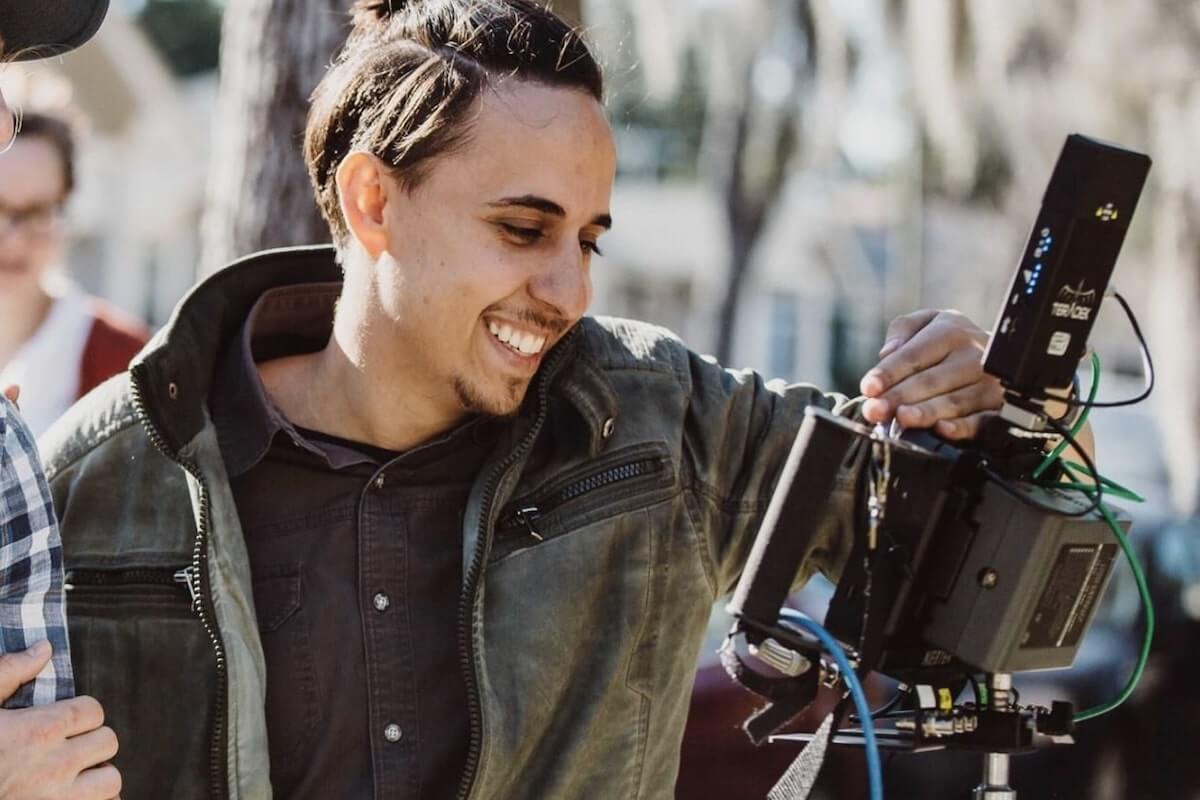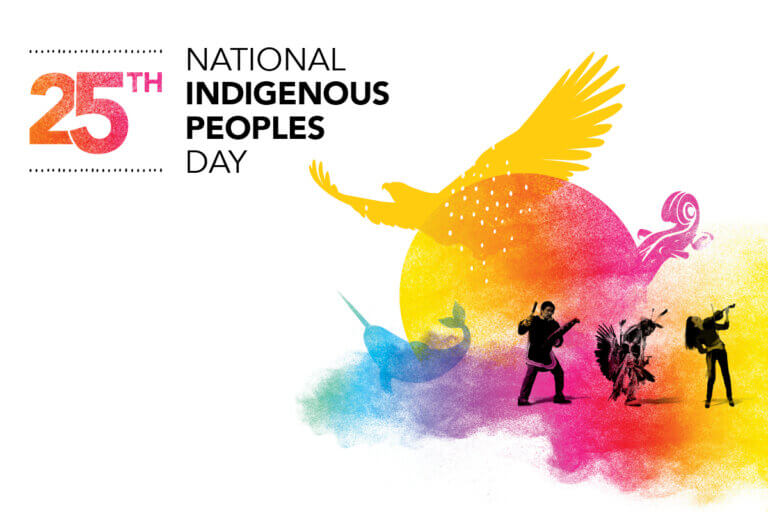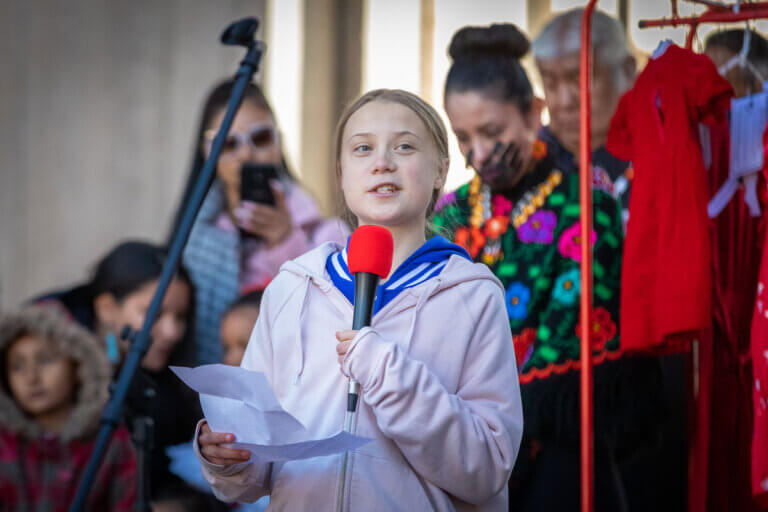Even as a small child, Not Going Quietly director Nicholas Bruckman knew in his bones he wanted to be a filmmaker. He spent a good chunk of his childhood lugging around a VHS camcorder, but he didn’t know what trajectory his career would take until the devastating September 11 attacks. As a native New Yorker, witnessing those events and the invasions in Afghanistan and Iraq that followed led to his involvement in the anti-war movement.
“Those events really shaped my psyche and consciousness,” he says. “I decided that my skills as a storyteller would be best translated to addressing those issues and to engaging directly with the world through stories.”
Since then, Bruckman has dedicated his career to developing content that addresses the need for social change. In 2011, he founded People’s Television, a film production company that describes itself as working with “companies and causes that matter” with clients that include Greenpeace, TED and Black Lives Matter.
Filmmaking as an ‘Empathy Engine’
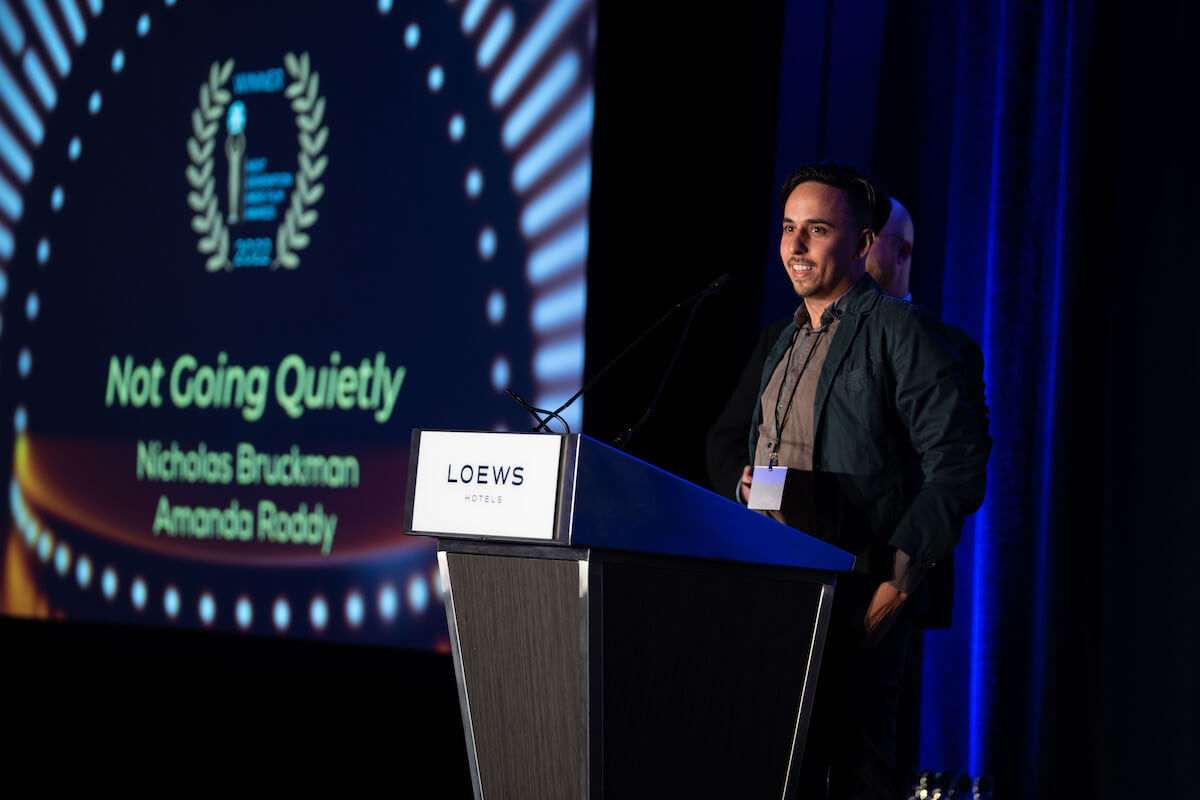
Bruckman believes in the power of film to make an impact and challenge our preconceived notions of people who are different from us. He describes film, particularly character-driven, documentary style storytelling, as an “empathy engine that breaks down a lot of the barriers and xenophobia and fear of the unknown.”
“One thing that film does uniquely is more than any other medium in my experience, more than the written word, more than academia, is to give you the sense and the opportunity of walking in somebody else’s shoes,” he says.
Looking at his filmography gives insight into the types of issues he’s passionate about covering. Bruckman directed and produced La Americana, a documentary about an undocumented woman living in New York City who struggles to save her ailing daughter’s life in Bolivia during their separation. He also produced Valley of Saints, a movie set in war-torn Kashmir about a budding romance between a working-class boatman and a young scientist during the military curfew in 2010.
His most recent film is Not Going Quietly, a documentary released in 2021 about Ady Barkan, an American lawyer and activist who embarked on a national campaign for healthcare reform after being diagnosed with ALS, a progressive neurodegenerative disease.
Making Films About Ordinary People Changing the World
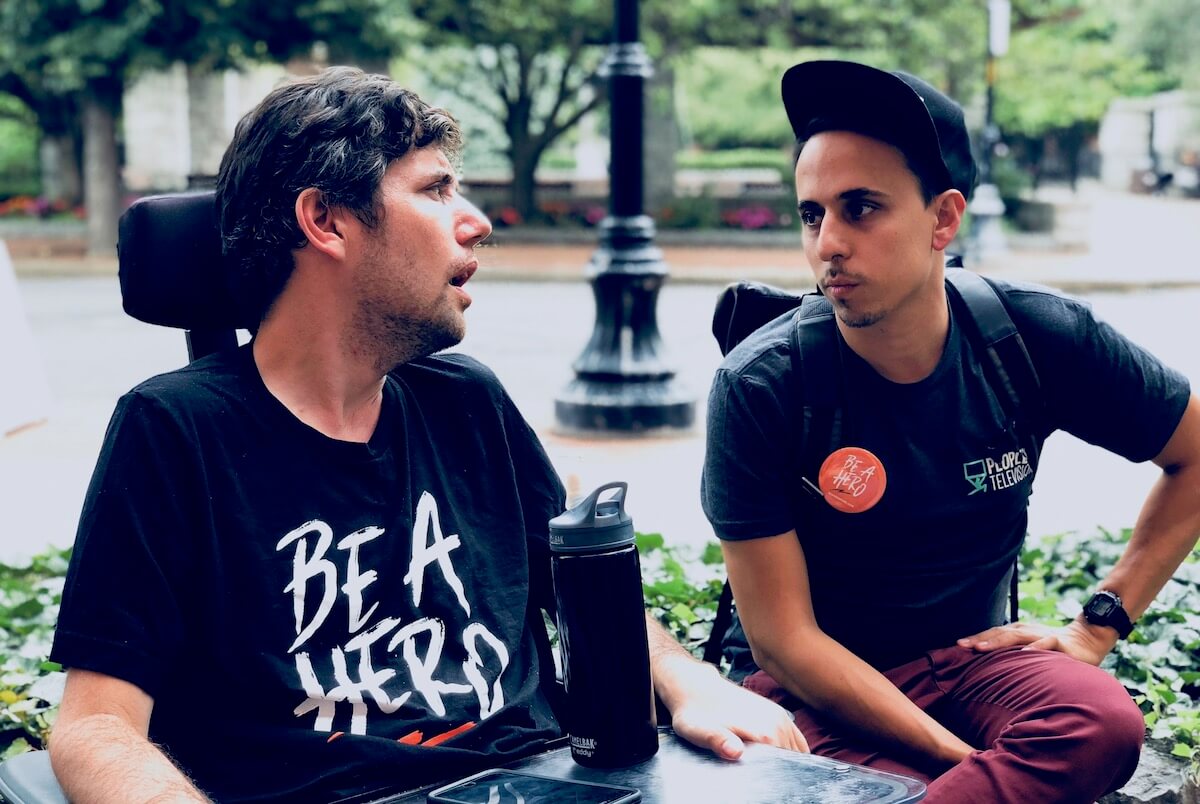
In Not Going Quietly, Bruckman shows the audience the power of activism, and sharing one’s personal story. The film follows Ady Barkan across the United States as he fights for health care reform. Barkan was diagnosed with ALS at the age of 32, shortly after the birth of his son.
Bruckman says to help people understand the complex issues the world is grappling with, he is intentional in his documentaries about not interviewing experts, but rather focusing on the lives and stories of people personally impacted by that issue.
“People’s pain like Ady’s, that all of us have in our lives, have an intrinsic power — both healing for the individual, but also for the society — to be shared,” Bruckman says.
The Powerful Moment When Ady Barkan Confronted a Senator
As part of his campaign, Barkan journeyed across the country to bring attention to the issue, while ALS took away his ability to walk and talk.
In December 2017, Barkan’s story was catapulted to national attention when he confronted Arizona’s Republican senator Jeff Flake on a plane. Barkan asked the senator to “be a hero” and vote no on tax cuts, which Barkan was concerned would restrict access to health care for people with disabilities like him. The exchange was captured on video by another activist.
At one point, he says to the senator: “What should I tell my son, or what should you tell my son, if you pass this bill and I can’t get a ventilator? You can be an American hero. You could save my life.”
Bruckman says before the plane even landed, the interaction went viral. “Ady became the face of this issue because his plea to the senator was so powerful and so persuasive,” he says.
Following Ady Barkan on the Road in Not Going Quietly
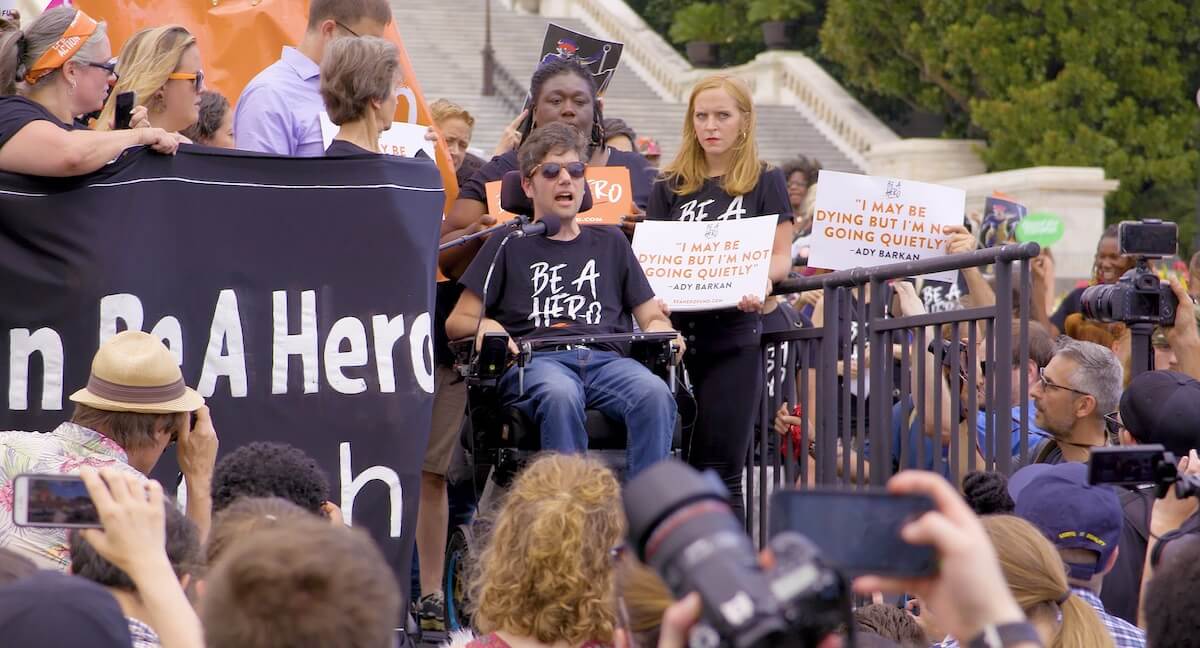
Related Articles
Bruckman initially met Barkan to film a fundraising video for the new “Be A Hero” campaign and was instantly struck by the activist’s personality. “Ady is this incredibly funny, self-deprecating, pot-smoking, joyous activist who is infectious with hope and energy,” Bruckman says.
Bruckman pitched the documentary to him, and after mapping out the logistics, followed Barkan in an RV for two years, while the activist toured the United States to talk to voters, and testified before Congress in favor of Medicare for All.
“A big part of his movement was about the power of social media and the power of storytelling to shape public discourse, to shame politicians and to close the gap between the elected and the voters,” Bruckman says.
While creating the film, Bruckman says he was intentional about showcasing all aspects of Barkan’s life. There are scenes where Barkan is leading rallies across the country, and others where he’s spending time with his wife and son. Bruckman describes these scenes as “joyful moments that display what’s possible with family and community, if we create a society in which we take care of each other through things like basic access to healthcare.”
Not Going Quietly Documents Barkan’s Life and Legacy for His Family
For Bruckman, creating the film was a way to document Barkan’s life and legacy for his family. He described how the biggest impact for him of the whole process was seeing Barkan attend the L.A. premiere of Not Going Quietly.
“He got the rousing standing ovation that I had always promised him when he showed up,” he says. “That was never certain when we began the film, that there would be a film that Ady could still be around to celebrate his success, and to get the recognition that he deserves for the work that he’s done. And so to be able to honor his legacy and have his family there for that, was really one of the highlights of my life.”
Film Is a Catalyst and Tool for Activists
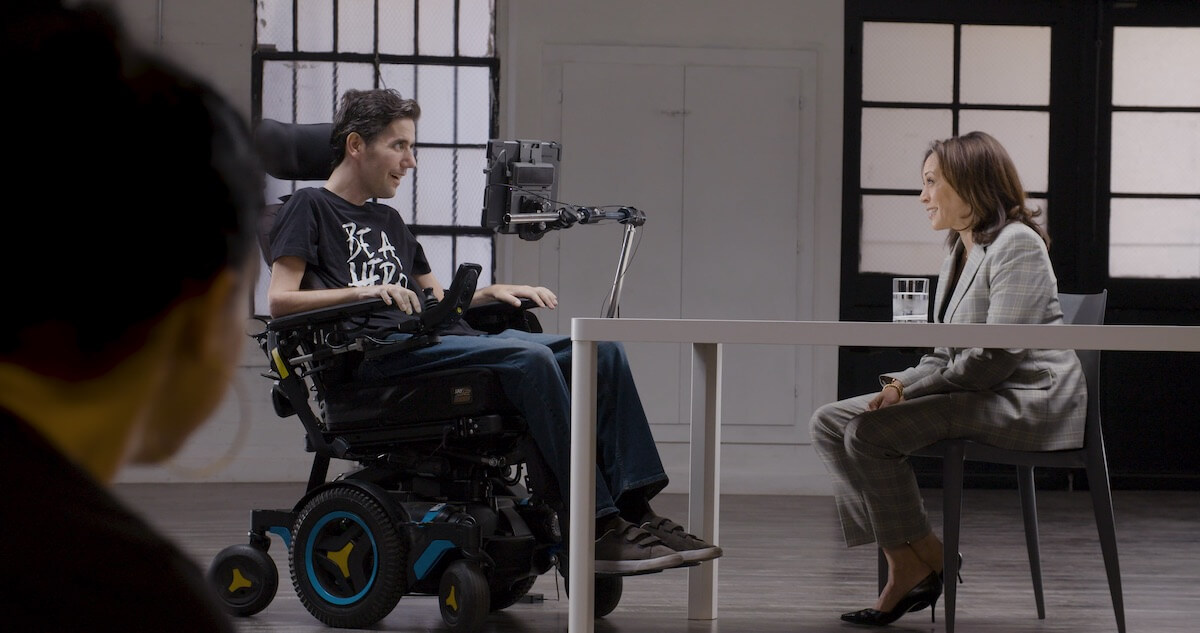
Throughout the film, Bruckman showcases the power ordinary people have to change the world when they come together.
Bruckman says that film doesn’t change the world – organizers and activists do. He hopes his films can serve as a catalyst, or tool, for those doing the work on the ground: “It’s like nourishment for their souls to feel seen and to be energized and to create solidarity – whether that’s to people who discovered these issues for the first time through the film, or the people who already know, but didn’t feel empowered to do anything about it or never met somebody going through that thing.”
Technology Has Revolutionized Activism
Bruckman describes how camera phones, social media and other technology has revolutionized how activists like Barkan can share their own stories and respond to some of the most pressing issues of our time.
“The thing that’s so incredible that I’ve witnessed in the last 10 years is the democratization of the tools of storytelling,” he says. “And that of course is primarily referencing the camera phone and social media. Those are the tools that Ady uses, and the activists. They really are filmmakers, even though of course, none of them are. They’re just organizers with stories to tell. And through the power of their own voices with no training, they are creating media that has perhaps equal or bigger impact than the films that I make.”
He references the cellphone video of Barkan confronting the senator: “Everybody has those tools now. And of course, there’s a dark side that we all know to social media and to the ubiquity of cameras, but these tools in the hands of people who want to change the world are there and available. And I think that’s a very hopeful thing.”
Ady Is Still Using His Voice to ‘Make a Better Country’
Barkan is still alive and working to advance democracy and healthcare justice in the United States: “And he’s doing this all with his eyes because Ady is now fully paralyzed, from head to toe, and he uses an eye gaze technology, which tracks his pupils to communicate, but he’s very active on Twitter and he is very active organizing the “Be A Hero” movement. He has the ears of many of the most progressive and powerful politicians in the United States and he uses his platform and his voice – his artificial voice – to make a better country.”
To watch Not Going Quietly, find a screening near you at notgoingquietlyfilm.com or stream it through Hulu.
You might also like:
Lead image credit: Nicholas Bruckman, the director of Not Going Quietly, working on set. Photo courtesy of People’s Television.
